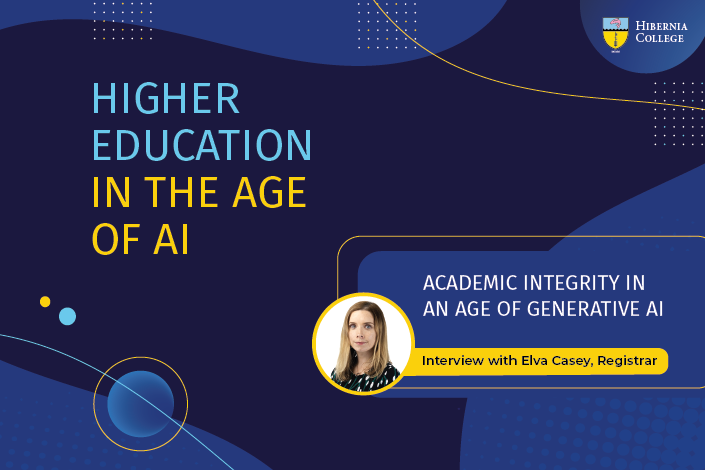
Welcome to our series on Higher Education in the Age of AI. We begin with an introduction to the topic by Elva Casey, Hibernia College Registrar. Elva answers some of our most pressing questions around academic integrity in an age of generative AI.
ChatGPT and generative AI are everywhere in the media now. There are so many different messages, and it can be quite daunting and confusing… Should we be worried?
ChatGPT and generative AI are certainly something that is capturing the public imagination. While the advances in generative AI represent new and developing challenges for educators, as a College with a strong background in digital education, we are in an excellent position to address them. We work closely with the National Academic Integrity Network (NAIN) to ensure that we are following best practices in assessment design and implementation. We are also communicating with students through focus groups to better understand what the challenges might be for them.
Why is there so much conversation right now about generative AI and academic integrity?
Academic integrity is central to good and robust assessment practices. Put briefly, academic integrity is the commitment to and demonstration of honest and moral behaviour in an academic setting. Robust assessment ensures that students have met the learning outcomes in order to proceed on a course of study. The concern is that generative AI can be misused in order to circumvent those standards.
What is generative AI?
Generative AI is a type of artificial intelligence technology, which can produce content, including text, imagery and audio. While it has been around for some time, there have been very significant advances recently. The most notable generative AI is ChatGPT.
What is ChatGPT?
ChatGPT is a chatbot launched by OpenAI. It is a natural language processing model designed to generate text similar to human writing in terms of style, content and structure. As such, it can produce natural and nuanced text in response to prompts.
As a student, could I use ChatGPT to do my assessments?
Focus groups with our students have revealed that students are aware of the ethical and learning specific reasons why this would not be appropriate to do. However, there are also a number of other reasons including the difficulties generative AI has with referencing, the fabrication of information and the inconsistencies in writing style. As a learner, the misuse of generative AI prevents you from fully engaging with your studies.
Should I just ignore ChatGPT?
There is significant debate in the academic community at large as to how to appropriately use and engage with this area. There are arguments put forward that it can be used for research purposes if engaged with appropriately and with a critical eye. However, it should not be used as a direct response to an assessment without specific direction to do so. Assessors are being given guidance on how to create and assess authentic assessments that assess the process of learning as well as the end product. As a learner, always value your own ethical standards and remember — the purpose of assessment is to demonstrate your own learning.
What is Hibernia College doing to address these issues?
The College has set up a cross-departmental Community of Practice to address these new challenges. Some really interesting initiatives are developing from this, including the establishment of a group of Academic Integrity Champions, the development of a new sharing platform on AI resources, and the creation of supports and guidance for assessors. We are updating our policies and procedures to reflect these new challenges. We also always welcome student input and will continue to reach out to students to learn from your experiences.
The pressures of assessment can be significant. Is that when students might be tempted to engage in unethical practices?
Yes, absolutely, and there are a number of different cheating services, which unfortunately prey on students who they identify as vulnerable. Essay mills, plagiarism tools and cheating services are fundamentally doing the students a disservice. They put the students in a vulnerable position and deprive them of the opportunity to develop and improve. The repercussions of engaging with such services can go beyond the programme and reach into professional careers. We strongly encourage our students to report these services to us.
Any final words of advice?
Academic integrity is fundamentally about respecting your own value as a learner and the integrity of the qualification you are working towards. If you feel overwhelmed at any point by the workload, reach out. The College has a student support structure in place that includes pastoral, academic and administrative support.